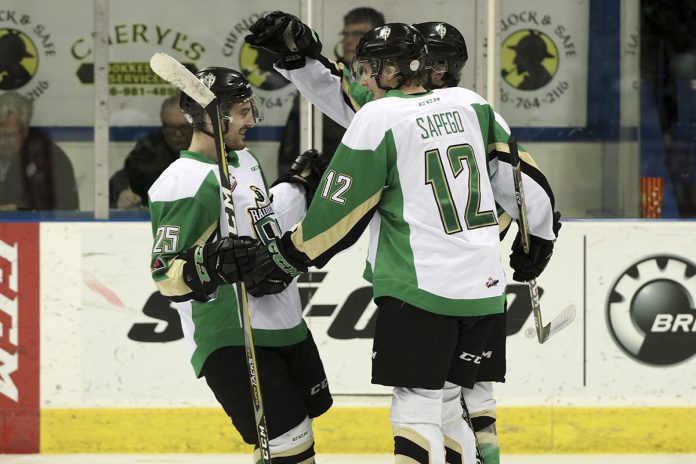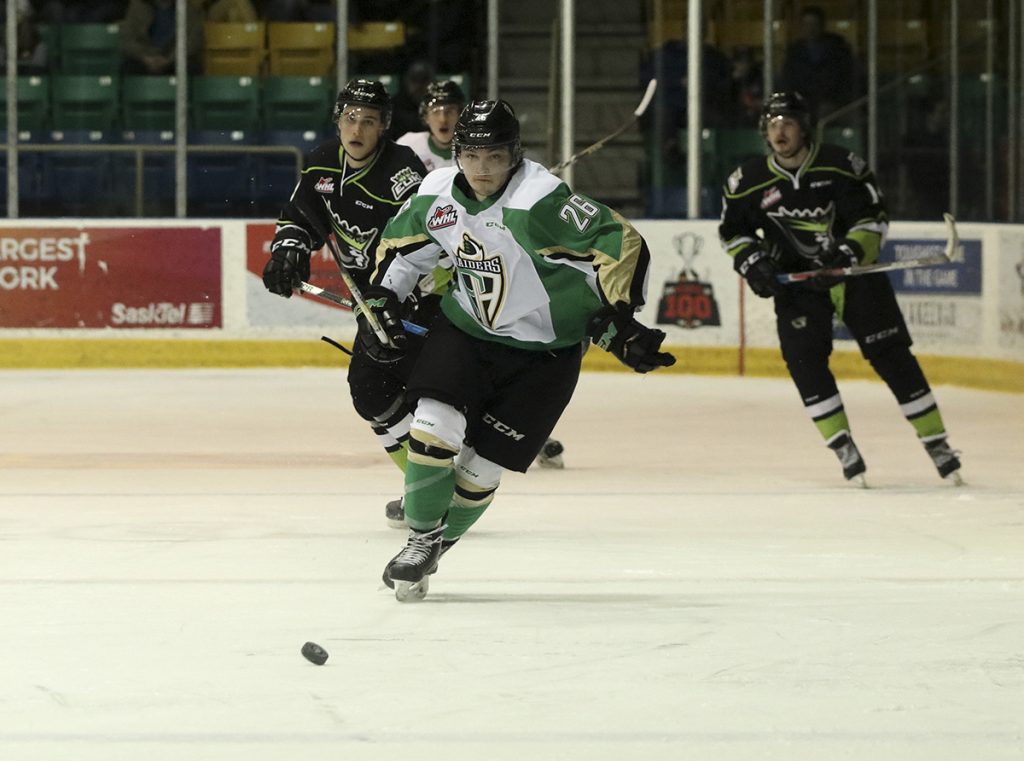
It’s been something of an up-and-down year for Prince Albert Raiders defenceman Sergei Sapego.
After the Western Hockey League club acquired the Belarusian off of import waivers from the Tri-City Americans in September, he began to slowly work his way into the lineup, carving out a spot for himself as a quick, puck-moving d-man.
But on Dec. 1 while playing in Calgary, he took a nasty slash to his forearm, which sidelined him for two full months.
Aside from a single game on Jan. 20 in Medicine Hat, Sapego had to sit out and watch his team contend with the WHL’s other East Division clubs to grind out a wildcard playoff spot.
That’s on top of the fact that the 18-year-old rookie is still learning the English language.
On Feb. 7, Sapego got back into the lineup.
He’s remained healthy through those 14 games since his return; he’s also logged valuable, regular minutes on the team’s power play.
As for his offensive abilities, Raiders defensive coach Dave Manson usually pairs Sapego with one of the team’s other quicker, offensively-inclined defenceman, Max Martin or Konrad Belcourt.
And he’s starting to find offensive success, too.
Through those 14 games, he’s tallied seven total points. Despite his absence, his plus-minus rating on the year is +2.
When Sapego’s not on the score sheet, he’s often breaking up opponent’s plays, creating turnovers or pinching at an opponent’s blue line to keep the Raiders in the offensive zone.
On the personal front, he and Raiders forward Nikita Krivokrasov have formed a personal bond; they both speak Russian, and Krivokrasov has been helpful in translating for Sapego and teaching him the ins and outs of English.
Ahead of the Raiders’ Friday night game against the Moose Jaw Warriors, Sapego joined the Daily Herald, with translation help from Krivokrasov, for a short interview.
The following is an edited version of their chat.
Daily Herald: Now that you’ve returned from injury, what’s your feeling that you now have a defined role on the defensive unit of the team?
Sergei Sapego: At first I didn’t play a lot, because I was just getting a feel for the game after the injury, but the coaches are trusting me a little bit more now. I’m playing good d, and good offensively.
I’m producing points, and that’s good for me and for the team.
DH: Are you happy to be getting time on the powerplay unit?
SS: Yes, I’m pretty happy to get that opportunity. The coaches looked to change something up, and it worked out.
DH: What’s it been like for you to transition from playing forward to playing defence?
SS: To be an offensive defenceman, you have to be more responsible in the d-zone to get that offensive instinct. And once you’re in the zone, it’s just the natural ability that you have.
DH: How do you feel about your defensive unit and your partners?
SS: Right now, Marty (Max Martin) is on a hot streak, so I enjoy playing with him, and producing points and getting along really well.

DH: When you travel on the road for away games, who’s the best roommate to travel and bunk with?
SS: The best translator in the world, Krivokrasov.
DH: Regarding Martin and his points streak, it seems like everyone on defence is having a lot more offensive success. Why do you think that started after the Christmas break?
SS: Mostly just because the coaches get us on offence a little bit more, get us involved a little bit more in the offensive zone.
I think our forwards do a good job of rolling high with the d and making plays up top.
DH: What’s it been like for you, coming from Belarus to Washington State, and then to northern Saskatchewan? How have you found the adjustment process?
SS: It’s tough coming from Belarus, because of a bigger ice sheet and a smaller rink here. It took me about five games to adjust.
I think the language barrier is also tough, because it’s communication on the ice with the players. So I’ve adjusted well.
DH: On the personal side: Because language is so important to building connections and keeping a culture, how important is it to have Nikita, someone who can speak Russian with you, to make you feel more comfortable here?
SS: It helps me on and off the ice.
In games it’s easy to communicate, because he can explain things to me and talk to me on the ice.
Off the ice, it’s good, because you build a relationship.
It’s good on both parts; it creates a friendship and it creates a good environment in the locker room.
DH: Are you going to buy Nikita lots of suppers, because he’s doing lots of translation for you?
SS: Yes, I have to.
Nikita Krivokrasov: I hope he lives up to the expectation.

